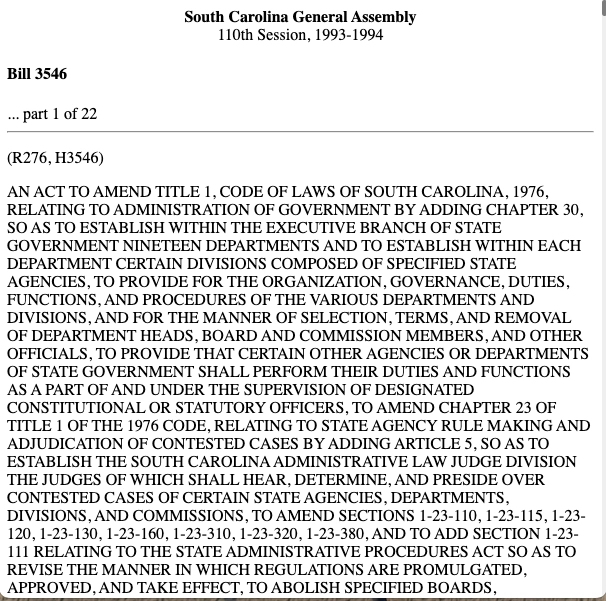If you picture South Carolina’s government as an org chart, the legislature sits at the top when it comes to making laws. They hold priority on legislative moves, and South Carolina is one of the few states operating under what is called a legislative state because of the amount of power legislators hold. Even if the Governor vetoes something, the legislature can override that with a two-thirds vote, and they do use it.
The Governor sits on the executive side of the chart. That role includes carrying out the laws that the legislature passes, managing the state’s cabinet agencies, and setting priorities for how government runs day to day.
Most people assume South Carolina has a weak Governor, meaning the office holds limited powers. That may be true to some extent, but what many do not realize is the extent of power the Governor does hold. To explain that, let’s talk about what happened in 1993.
That year, Act 181 (massive House Bill H. 3546) was enacted, and it restructured South Carolina’s entire executive branch. Before 1993, most state agencies were run by boards and commissions chosen by the legislature, which kept real control in legislative hands. Act 181 created the cabinet system and placed many of the most important agencies directly under the Governor’s authority.

This change meant that the Governor could now appoint the directors who run agencies such as:
Transportation
Public Safety
Revenue and Taxation
Health and Human Services
Commerce
Social Services
Natural Resources
Corrections
…and more, including Agriculture and Education (though those two leaders are elected).
Under the law, most of these departments are led by a single director appointed by the Governor with Senate confirmation. Once in place, these directors manage the agency’s daily operations, oversee programs that impact citizens statewide, and create regulations.
The law also gave the Governor broad reorganization powers. They can restructure divisions within a department, consolidate programs, and appoint deputy directors to oversee major areas. While the legislature must approve dissolving an entire division, the Governor has significant flexibility to shape how each agency operates.
In short, Act 181 concentrated much of South Carolina’s administrative power in the executive branch for the first time.
Fast forward to today. That authority has grown even more. One clear example is Senate Bill S.2, which created the Department of Behavioral Health and Developmental Disabilities. Governor McMaster signed this legislation in 2025, merging three separate agencies into a single cabinet-level entity under the Governor’s direct control.
Another example is House Bill H.3309, the South Carolina Energy Security Act, signed into law in June 2025. This legislation expanded the Governor’s influence in energy policy and regulation, from requiring faster approvals for major projects to shaping the state’s long-term energy planning and infrastructure priorities.
Budget power is another area that cannot be ignored. The Governor has greater ability to decide where your tax dollars go through the executive budget proposal and by directing agencies on how to spend that money once the budget is passed. That means the Governor can direct not only what gets funded, but also how those funds are used.
And then there was Senate Bill S.915, which proposed creating a cabinet-level Executive Office of Health and Policy. It would have consolidated multiple health agencies under one Governor-appointed secretary with sweeping authority. The bill didn’t pass, but don’t assume legislators won’t try again.
So why is this important? In 2026, South Carolina voters will choose the state’s next Governor. The June primaries will decide which candidates make it to November and who will ultimately hold the office. And the weight of that decision is often underestimated. Many people tune out during the Governor’s race because they’ve been told the position has little power. That belief is wrong.
What happened in 1993 and the growth in authority since then directly challenge the idea that South Carolina has a weak Governor. The Governor has the power to appoint agency heads, and those agency heads do one thing that should concern you: they write a lot of regulations, and those regulations have the force of law.
The other important power of the Governor is influence. That influence power is strong enough to sway legislative decisions.
Don’t assume the Governor’s race is irrelevant or that you shouldn’t put effort into researching who you will vote for in the June primaries. Do your deep dive beyond the headlines and grand campaign speeches. And after you vote, stay involved because what you continue to do after Election Day matters even more than the vote itself.
Disclaimer: The views expressed in this article are those of the author and do not constitute legal or professional advice. ConservaTruth assumes no liability for any actions taken based on this content. Read more.

Subscribe to ConservaTruth's Email Newsletter for curated insights on South Carolina's legislative activities and conservative viewpoints, delivered straight to your inbox! With vetted and easy-to-understand information, our newsletter empowers you to become an informed and engaged citizen, actively participating in safeguarding our cherished Constitutional values. Don’t miss out on crucial updates—join our community of informed conservatives today!





Comments